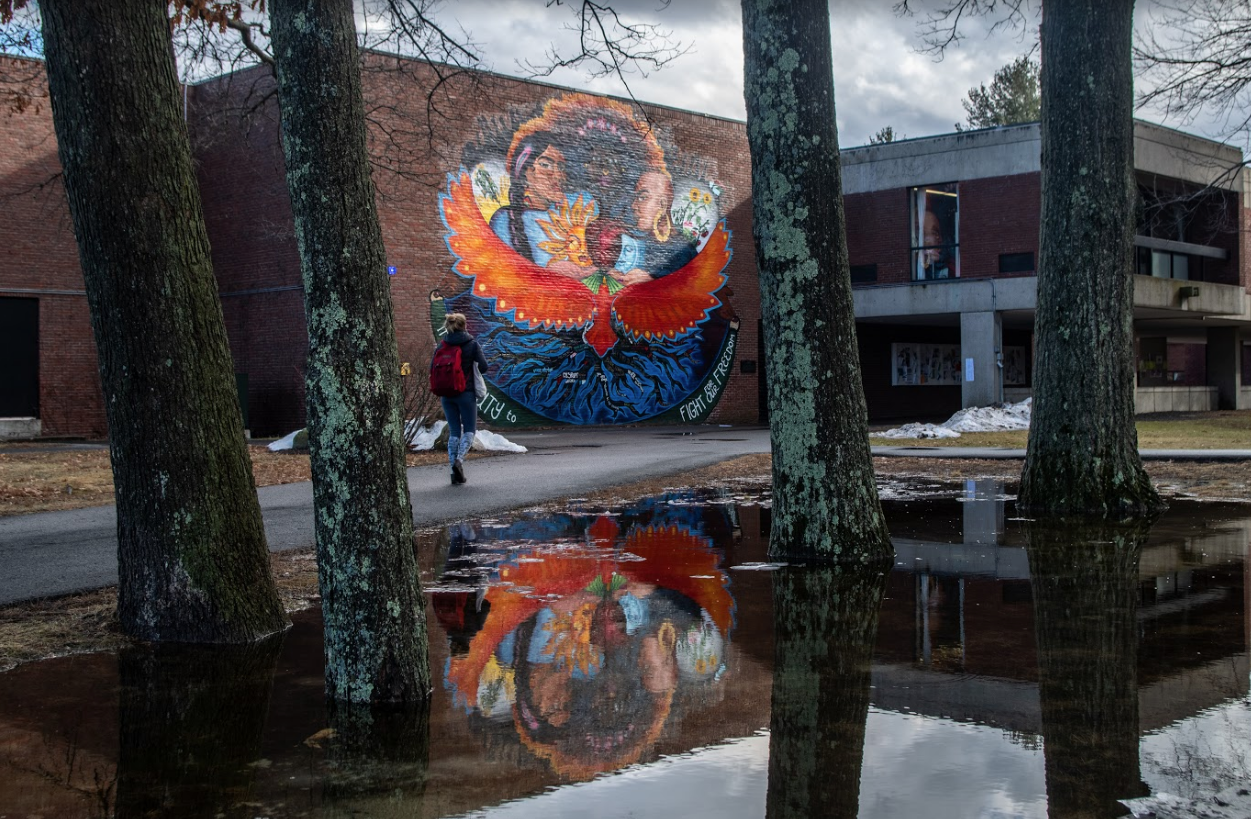Hampshire Students Raise Voices in Response to Crisis

When Naia Tenerowicz, a second-year student at Hampshire College, went to check her email near the end of her winter break, she didn’t expect to learn that her college might not be accepting a first-year class next fall. Nobody had told her that such an option was even being considered, so the announcement was especially difficult to process. Indeed, Tenerowicz was not alone in this reaction — all of the students, faculty and staff at Hampshire were informed at the same time, with no prior indication given to any group.
Hampshire’s administration was immediately flooded with questions by various stakeholders who wanted more clarity and transparency about their decision. But nearly a month later, Tenerowicz, along with many others in the Hampshire community, is still looking for answers from the school’s administration, accusing them of leading a deliberately opaque process in making these administrative decisions and violating the principles of shared governance on which Hampshire was founded.
“The student body, staff and faculty have gotten so little information about [this situation] because it’s all tied up behind non-disclosure agreements,” Tenerowicz said. “Our biggest concern is that shared governance and transparency are not being respected.”
Tenerowicz currently helps lead a student group formed in opposition to these recent decisions named “Hamp Rise Up,” which has organized much of the student response to the administration. Students from this group have conducted sit-ins at the the Cole Science Center and the Dean of Students Office for two weeks, while also negotiating with Hampshire President Miriam Nelson to advocate for certain student interests.
Among their demands are the termination and discontinuation of non-disclosure agreement usage by the administration, direct student, staff and faculty voice in all future decision-making processes and the preservation of certain services and staff essential to traditionally marginalized groups on campus.
“Every single one of our demands were passed in a town hall meeting with, I believe, over 100 students.” Tenerowicz said. “They all passed with a supermajority, which is more than 80 percent.”
For Tenerowicz, this activism is part of a larger fight to maintain the essence of what makes Hampshire unique. “In our meeting with President Nelson, it became very clear that they were more committed to preserving the name and reputation of Hampshire than the actual things that make Hampshire ‘Hampshire,’” she said. “Hampshire’s a really special place to me and to a lot of us, and that’s why we’re fighting so hard. We want to see the school survive this, with the actual spirit of what makes Hampshire ‘Hampshire’ intact.”
“There’s a basic misunderstanding amongst the executive committee of the board [of trustees] of what Hampshire means to all of us,” Tenerowicz added. “I’ve always known what I want to study and it’s not anything offered at other schools — it’s something I had to make myself. And I hate being graded. … If we lose any staff members, I, and a lot of other people, might lose our literal right to an education at this institution.”
Syd White, a first-year Hampshire student also involved with the Hamp Rise Up movement, shares these sentiments. “Things that are under threat in particular are things like the James Baldwin Scholars Program and the Cultural Center, which directly support students of color,” they said. “If this school is not going to be a place that supports students of color, that supports differently abled people, I don’t want to be a part of it.”
A number of students also expressed opinions that were less favorable to the Hamp Rise Up movement. Ida Kao, a first-year Hampshire student, voiced that “neither side, neither administration nor protesters, in my opinion, has allowed for free, open and democratic processes to occur.” Hamp Rise Up has restricted its members from speaking to the press without approval, an act that Kao called “authoritarian.”
Even with the surge of student activism, many remain pessimistic about the situation at hand. According to Tenerowicz and Kao, a large number of students are considering transferring to another school in light of the college’s current instability.
Still, some students view the situation with ambivalence or even positivity. Many in the Hamp Rise Up movement tried to focus more on the community that these protests have fostered, as well as the tangible changes they’ve managed to accomplish.
“Honestly, for something that initially sounded so negative, I think we’ve really turned it into something really positive,” said White. “I think a lot of our demands or requests have been centered around asserting our autonomy as students, and asserting that we do hold power in this school. This school exists because of us, and we should be given a say in it. By taking a physical presence in the office, we are physically asserting that belief.”
“[This situation] has gotten me the opportunity to be in close proximity to those who are working with or in the administration, so I’ve gotten to know them better as people. So, I think it’s definitely increased visibility between the students and administration,” added Whealon Costello, a third-year Hampshire student involved with Hamp Rise Up. “The conversations we’ve had with President Nelson, they’ve done their best to reassure us that they care about what we care about.”
Students also pointed to the role that the other four colleges of the Five College Consortium can play in alleviating issues at Hampshire. Tenerowicz suggested that students from the five colleges could help by sitting in with them or lobbying for formal support from their respective student governments, while Costello expressed her appreciation for the moral support from the other campuses.
Even those who are currently pessimistic have reason for optimism, according to Tenerowicz. “They are actually working on meeting a few of our demands.” she said. “There’s nothing confirmed yet, but they’re looking at limiting usage of non-disclosure agreements. And that would be a start.”





Comments ()